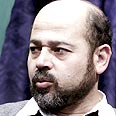
Senior Hamas leader: Israel exists
Moussa Abu Marzouk, deputy of Hamas politburo chief Khaled Mashaal, tells Israeli-Palestinian radio station that 'there's no doubt there is realistic recognition on our part of Israel'; adds group's problem is demand to recognize legitimacy of occupation
"Israel exists and we all acknowledge these agreements. The problem is not that, it is the demands made on Hamas. Our problem is that there is a demand to recognize the legitimacy of the occupation – and to that we won't agree," Abu Marzouk, a lieutenant of Hamas politburo chief Khaled Mashaal, told the Israeli-Palestinian radio station "All For Peace."
These comments, as well as the choice of station, an Israeli-Palestinian outlet, can be seen as a clear display of pragmatism on the part of Hamas towards the Israeli public and opinion-makers.
The comments were made in response to the question of whether there was significance to the Hamas announcement in which it said it would acknowledge the agreements signed by the Pa with Israel "in a realistic manner" – in actually recognizing Israel, and whether Hamas wants to lead the PA, despite the fact that from an ideological perspective, it will continue to claim that it does not recognize Israel's right to exist as an 'occupier of Islamic lands.'
'Sharia rule'
Marzouk also said, during the same interview: "We are facing changes, and every movement will make changes according to reality. But we won't compromise on three principles: Rule according to the principles of Sharia (Islamic law), our right to live in Palestine, and our right to resist the occupation."
Speaking from Damascus, Marzouk also condemned the steps by Israel against the PA.
"The international community should accept Palestinian democracy," he said.
"The Hamas government was elected by the Palestinian people in a democratic manner, and the world must accept the choice of the people. After all one of the aims of the United States is to spread democracy, and the Palestinian people must not be punished for choosing Hamas," Marzouk said.
Marzouk added: "We as Palestinians tried to go down the road of negotiations, but to no avail. The PLO recognized Israel – but this is an internal PLO manner and it does not obligate the PA. This would mean to distinguish between the PLO and the PA. There's no need for the PA to recognize Israel."
That stance could be the official stance of the new Palestinian government, allowing Hamas to work side by side with Mahmoud Abbas as PLO Chairman, who will serve as "the diplomatic face" of the PA to the world.
Abbas presented three conditions to the Hamas leadership: Respect of agreements signed with Israel, abandonment of terror, and recognition of Israel's right to exist. The third clause is the most problematic for Hamas – and it could now have found a compromising internal Palestinian formula, hinted at by Marzouk
Marzouk is 55 and son of a family which came from Yavne, and which was forced to move the Rafah refugee camp after 1948. After finishing high school in Gaza, Marzouk completed engineering studies in Cairo in 1976. After his studies, he searched for work in the Persian Gulf like many Palestinians.
In 1990, after studying in the U.S., he received a doctorate in industrial engineering. But his political activities in the Muslim Brotherhood began in 1968. He advanced in the Hamas hierarchy, especially in 1989, after a mass arrest of Hamas leaders during the first intifada.
In 1992, Marzouk was elected to lead Hamas’s political headquarters in Jordan and operated from Amman until his expulsion in 1995. In the nineties he was arrested in New York and charged with terror activities. Washington refused to hand him over to Israel and he remained in jail until 1997.
All for Peace radio
After his release he was appointed as the deputy of political leader Khaled Mashaal. He is seen as a lynchpin between the Hamas leadership in exile and in the Gaza Strip.
All for Peace radio station is a joint project led by Palestinian group Biladi and the Jewish-Arab peace center in Givat Haviva. Besides its broadcast of music, shows and programs, the station serves as a platform for Israeli and Palestinian peace organizations whose voices are unheard in mainstream media.
The radio broadcasts in three languages: Arabic, Hebrew and English.










